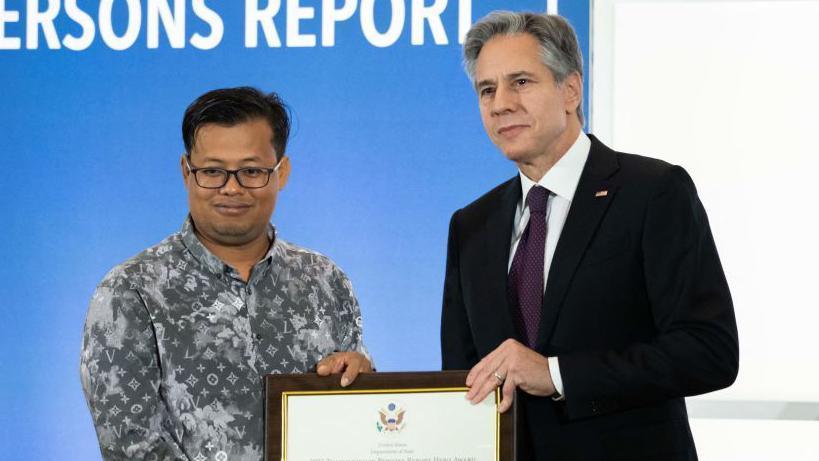Award-winning Cambodian journalist who exposed cyberscams is arrested

Mech Dara has been honoured for his work by US Secretary of State Anthony Blinken
- Published
Mech Dara, an award-winning Cambodian journalist who has reported extensively on human trafficking and corruption, has been arrested and charged with incitement.
Dara, who has reported for the BBC, has been charged over five social media posts which could "incite social unrest", a court spokesperson said. He faces up to two years in jail.
Last year US Secretary of State Anthony Blinken honoured him for his work exposing online scam operations based in Cambodia.
Rights groups have spoken out over his arrest, while the US Embassy in Cambodia said it was "deeply troubled" by the news.
Dara was detained after being stopped at a highway toll booth on the border of Koh Kong and Sihanouk province in south-west Cambodia on Monday.
A relative in the car with Dara told the BBC that they were waiting to go through the booth when one military police car, accompanied by five other cars, pulled up alongside them.
"We got him," one said while they were detaining Dara, his relative recounted, adding that Dara told his family not to worry as he was being taken away.
Local rights group Licadho reported that Dara messaged them, explaining that he had been arrested, before his phone was taken away.
His whereabouts were then not known for almost 24 hours, when he appeared in court in the capital Phnom Penh and was charged with incitement to commit a felony. He was sent to pre-trial detention and faces between six months and two years in jail if found guilty.
Phnom Penh Municipal Court spokesperson Y Rin told the BBC that the charges were related to five social media posts made in September, but did not elaborate.
In a statement, the court said the Facebook posts showed "edited pictures" of a "tourist attraction" which it said were "fake".
Is said the posts were "full of ill-intention - inciting, causing anger among the public that was intended to make people think bad of the government".
The vague charge of incitement is often used in Cambodia against government critics.
One of Dara's relatives, who also works as a journalist but requested anonymity due to fear of reprisals, said Dara had been denied access to a lawyer and they were "so concerned" about his safety.
"The authorities didn't show us any official arrest warrant or court papers. I've lost hope, I’m so concerned about practising journalism in Cambodia now," the relative said.
'Every newsroom I work in gets silenced'
- Published15 February 2023
One of Cambodia's most prominent journalists, Mech Dara has been at the forefront of investigating the country's cyberscam compounds, which are staffed mostly by trafficked workers.
Often victims are lured by adverts promising easy work and extravagant perks. Once they arrive in the country, they are held prisoner and forced to work in online scam centres. Those who do not comply face threats to their safety. Many have been subject to torture and inhuman treatment.
Last year, Mr Blinken awarded Dara the US State Department’s human trafficking Hero Award, external for his work.
The US State Department said it was aware of reports of his arrest and was "following developments closely with great concern".
The US Embassy in Phnom Penh said it was "deeply troubled" by Dara's arrest and called for his release, calling him a "leading voice against human trafficking and online scams".
Last month, the US sanctioned powerful Cambodian tycoon and ruling party senator Ly Yong Phat - nicknamed the "king of Koh Kong" after his influence over his home province - over alleged connections to the cyberscam industry.
The Cambodian government said the sanctions were politically motivated.
Rights groups have voiced concern over Mech Dara's arrest.
Bryony Lau, deputy Asia director at Human Rights Watch, said “Mech Dara is a respected journalist who has reported on important topics in the public interest such as online scam centres. Yet Cambodian authorities appear to have wrongfully arrested him yesterday.
"They should immediately release him.”
Phil Robertson, director of Asia Human Rights and Labour Advocates (AHRLA), called Dara's arrest "outrageous and unacceptable" and "is emblematic of the Cambodian government's repressive, over the top reaction to any sort of criticism from the media".
Cambodia's independent media landscape has been hit hard in recent years, with publications including the Cambodia Daily and Voice of Democracy - both of which Dara worked for - closed down by authorities.